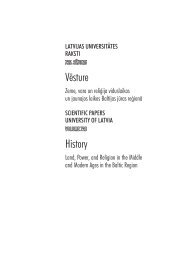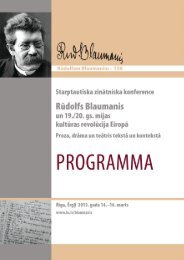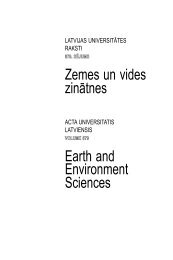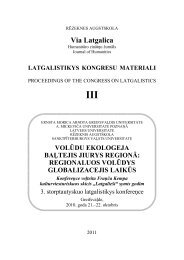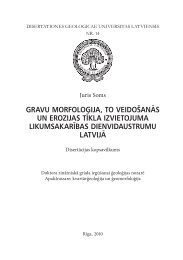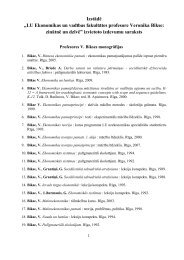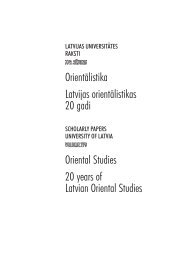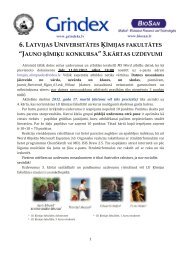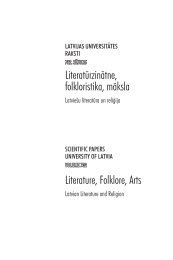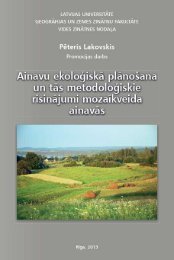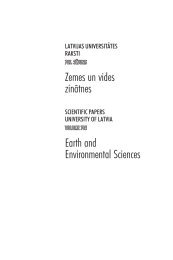Untitled
Untitled
Untitled
You also want an ePaper? Increase the reach of your titles
YUMPU automatically turns print PDFs into web optimized ePapers that Google loves.
154 LITERATÛRZINÂTNE, FOLKLORISTIKA, MÂKSLA<br />
fast. You have nothing but pity for those who lose a manuscript and then boast that<br />
they can restore 98% of it. Wretched creatures. You can restore nothing. Because<br />
whatever you write is born for that unique moment only. You are insured in Lloyd’s.<br />
If something is lost, you get the money back. And you move on. Not backwards. Indeed<br />
you think that in the work of those restorers that 98% is trash and it is only the<br />
missing 2% that are creative, new, unique. /…/ You have to act like Woody Allen.<br />
Spit on conventions. You have to produce, produce, produce incessantly. Until the<br />
time comes when critics are talking about your previous work, the readers are reading<br />
the new one, and you are talking about the coming one. Before long, the critics<br />
are completely fooled and there is nothing to prevent you from freely entertaining<br />
people. On–line. Real time. 24/7/365. /…/” 23 .<br />
In the fast–paced vibrantly energetic cadences of the passage, one can, of course,<br />
easily detect direct American literary and, perhaps even more obviously, cinematic<br />
influences. Kender himself has repeatedly and emphatically spoken about his admiration<br />
for and spiritual affinity with Tarantino. But one can also look at the text as a<br />
straightforward credo of a young Estonian out to conquer the world – a reading rendered<br />
all the more plausible by Kender’s own ambivalence about his status as a writer,<br />
his refusal to take on the high moral responsibilities traditionally associated with the<br />
role. What is more, judging by Kender’s phenomenal success, the credo is clearly<br />
shared by the majority of Estonians of at least his own generation. And the credo<br />
celebrates nearly every American value listed above.<br />
What is more, an Estonian would recognize in the passage a not–so–hidden polemic<br />
with the Grand Old Man of Estonian literature, the Nobel–nominee Jaan Kross,<br />
who did indeed lose a manuscript and declared that he had been able to restore 98%<br />
of it. However, it is not the personal polemic that is significant here (in an interview<br />
Kender actually admits to rather liking Kross’s novels), nor even a clash of generations,<br />
but rather an impassioned refutation by Kender – and his impressively large<br />
following – of the whole set of values, indeed the ethos, predominant in prewar independent<br />
Republic of Estonia and adhered to by resistance culture throughout the Soviet<br />
period, an ethos, as already mentioned, of predominantly German origin. The<br />
Estonian writer Tõnu Õnnepalu has perceptively pointed out that the anti–German<br />
ideology of prewar Estonia was, paradoxically, thoroughly German in its deeper layers24<br />
. Perhaps this is not so paradoxical, after all, as the German masters, though<br />
hated, were also actively emulated since the beginning of the Estonian National Awakening<br />
(a movement that itself was, of course, rooted in Herderian ideology). Jaan<br />
Kross, with the bulk of his work devoted to the exceptional Estonians who at various<br />
historical periods have managed to break free from their own ethnos and, as it were,<br />
become Germans, epitomizes this German ethos in more ways than one, starting with<br />
his choice of themes and the values he espouses up to his own manner of writing –<br />
meticulous, craftsmanlike, given to display of erudition, with passages carefully<br />
wrought and assiduously polished, every detail exuding the aura of the Teutonic style<br />
Kender’s revolt against this ethos is symptomatic of a general, though gradual,<br />
shift in newly independent Estonia from German to American values, as witnessed,<br />
for example, by the switchover of the Estonian mainstream press from the German<br />
paradigm, with its long, discursive, reflective, abstract essays, to the American one25 .<br />
The gradual nature of the shift and a continued coexistence of the two mentalities,



